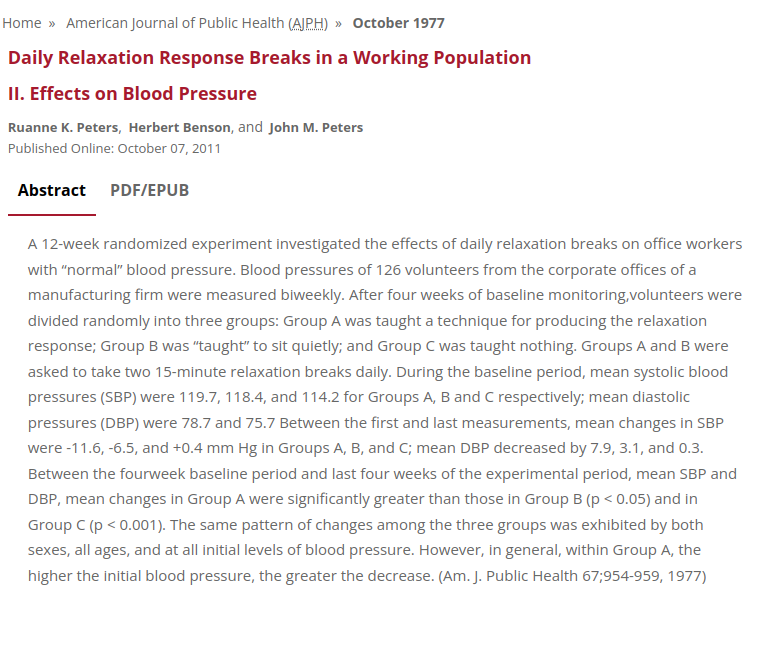A 12-week randomized experiment investigated the effects of daily relaxation breaks on office workers with “normal” blood pressure. Blood pressures of 126 volunteers from the corporate offices of a manufacturing firm were measured biweekly. After four weeks of baseline monitoring, volunteers were divided randomly into three groups: Group A was taught a technique for producing the relaxation response; Group B was “taught” to sit quietly; and Group C was taught nothing. Groups A and B were asked to take two 15-minute relaxation breaks daily. During the baseline period, mean systolic blood pressures (SBP) were 119.7, 118.4, and 114.2 for Groups A, B and C respectively; mean diastolic pressures (DBP) were 78.7 and 75.7 Between the first and last measurements, mean changes in SBP were -11.6, -6.5, and +0.4 mm Hg in Groups A, B, and C; mean DBP decreased by 7.9, 3.1, and 0.3. Between the fourweek baseline period and last four weeks of the experimental period, mean SBP and DBP, mean changes in Group A were significantly greater than those in Group B (p < 0.05) and in Group C (p < 0.001). The same pattern of changes among the three groups was exhibited by both sexes, all ages, and at all initial levels of blood pressure. However, in general, within Group A, the higher the initial blood pressure, the greater the decrease.
Daily Relaxation Response Breaks in a Working Population II. Effects on Blood Pressure
Publication
American Journal of Public Health
Abstract
Web and Email Links
Related Listings
Journal
Journal of Human Stress
Oxygen consumption is usually considered to be predictable and unalterable at a fixed work intensity. The relaxation response is hypothesized to be an integrated hypothalamic response which results in generalized decreased sympathetic nervous system activity. One physiologic manifestation of the relaxation response is decreased oxygen consumption. The possibility that the elicitation of the relaxation response could decrease oxygen consumption at a fixed work intensity was investigate […]
Journal
The Journal of Nervous and Mental Disease
A cross-sectional national telephone survey was used to determine whether Christian Scientists (N = 230), a religious group that uses mind/body (including spiritual) healing, self-report more or less illness than non-Christian Scientists (N = 589). The primary outcome measure was the proportion of Christian Scientists and non-Christian Scientists that, during the previous 12 months: a) experienced any of 13 common medical conditions or symptoms; and b) used conventional medicine, unco […]
Journal
Obstet Gynecol
During a 5-month study, we examined the effects of the relaxation response on premenstrual syndrome in 46 women who were randomly assigned to one of three groups: a charting group, a reading group, and a relaxation response group. The relaxation response group showed significantly greater improvement than the charting and the reading groups on physical symptoms (P less than .025 for both comparisons). There was a significant group-by-severity effect for charting versus relaxation resp […]

